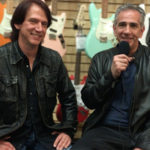Metallica guitarist talks about the thrash kings’ recorded return and his challenging creative path
By Gary Graff
December 30, 2016
If Kirk Hammett had a dollar for everyone who asked him during the past few years when Metallica’s new album would come out, he probably wouldn’t have to even be in Metallica anymore. However, Hardwired…To Self Destruct, the metal kings’ first new album since 2008’s Death Magnetic (not counting 2011’s Lulu collaboration with Lou Read) is indeed out, as of November and showed that absence indeed made fans’ hearts grow fonder by promptly hitting No. 1 in the U.S. and 56 other countries. Hammett somewhat famously lost a cell phone full of proposed riffs for the 12-song, two-disc set before Metallica hit the studio, but Hardwired… is still a playing tour de force, from the thrashing fast-burn of the title track to more expansive soloing on lengthy cuts such as “Here Comes Revenge,” “Halo On Fire” and “Spit Out The Bone.” Metallica plans to be touring hard for Hardwired…, well into 2018 if not longer, so we caught up with Hammett while at home, gearing up for the onstage onslaught Metallica does so well…
FGPO: Has it been long enough that you guys forgot what it’s like to put out a new album?
Hammett: [laughs] Y’know, when you make an album and it finally comes out it feels like a birthday. If there’s anything I could imagine feels like giving birth to something, it’s an album. And once it’s out there, it’s not really ours anymore. The intimate relationship we had with the music while we were creating it ceases to exist; we just acknowledge that it’s out there now and just see where it goes, see where it flies. At this point it seems like it’s taken wing and it’s flying pretty high and pretty far right now, so we’re very happy about that.
FGPO: It’s not like Metallica was out of sight during the intervening years. You must have felt the great anticipation that existed for a new album.
Hammett: We’re certainly aware of things like anticipation and the fans’ desire for Metallica material. There’s always an awareness of that. But when we make an album, you can’t let stuff like that enter into the creative process. You really have to pinpoint what you intend to do on a creative level and on a musical level and not let whatever else is out there in the world creep into the process, because it can muddy it up. If we’re trying to second guess what our fans would be expecting of us at any given time, would anyone’s answer be the correct answer? So our way of dealing is to not even give it much consideration in the first place and just go out there and make the best album we can possibly make.
FGPO: Was the out-of-the-box success a surprise? This is seven straight No. 1 albums for you guys, after all?
Hammett: Y’know, we’ve found that just because you’re an immensely successful heavy metal band, that doesn’t guarantee that everyone’s going to like everything we record. We’ve experienced great success in the past with stuff we’ve recorded and not so great success in the past with stuff we’ve recorded, so our attitude going into a new release is hope for the best, expect the worst. Just because we’re one of the biggest bands in the world doesn’t mean we’re gonna sell biggest band in the world record numbers. In the past we’ve not sold in the numbers we expected and it’s left us shaking our heads, thinking, ‘Why?’ So at the end of the day you just have to live with your participation and knowing you’ve done the best you possibly could. That’s good enough for me.
FGPO: So in the end, why DID it take so long between albums?
Hammett: Y’know, the arithmetic tells you it was eight years, but from the time Death Magnetic came out it was after six years we started working on this album, so it took two years. We took a couple years to tour behind Death Magnetic. We also made an album with Lou Reed. We did [the film] Through The Never. We continued to tour all over the world. We just over-obligated ourselves. We said yes to way too many things. We needed to prioritize this album, but we didn’t start prioritizing it until much later.
FGPO: So how did losing your cell phone and all those riff ideas impact on your contribution to this album?
Hammett: It created a situation where I did not have as much material as I wanted to have, so I was left to just focus on the other way I could contribute — my lead guitar playing. So I really tried to focus on getting my lead guitar abilities to the best that I could get them and then go into the studio and just improvise and really just capture a moment that we had not captured before and get a really good spur of the moment, spontaneous, stream of consciousness sort of performance and put that on the album.
FGPO: Is that different than how you’ve approached it in the past?
Hammett: In the past a lot of times when I’m coming up with guitar solos, usually the first things I play are the very best things. So having known this for a long time I really wanted to take that concept and really commit to it for the recording of these guitar solos. So what you hear on this album is totally stream of consciousness, hot, in-the-moment musical ideas that had very, very little time or preparation put into them, and in most cases no time and preparation put into them. The whole idea was to come up with something new and different and unique, which was a really scary thing for me to do because I didn’t know if I could pull it off in the same way that I have pulled off playing solos in the studio in the past. But I like to think I did!
FGPO: Because you didn’t have any compositional “ownership” of these songs, was it in a way liberating to just go in and create as the lead guitarist?
Hammett: That’s a question I’ve been waiting to be asked, and, yeah, there was a certain degree of…I don’t want to say burden being lifted but there was an aspect of being removed from it a little bit. It cleared the air and it gave me a little bit more of a clearer vision of what I needed to do and what I wanted to do. I felt like [the solos] were my one time to really put my mark on the songs, but the other side of that coin is I arrive at the song with no, like, attachment to any sort of outcome or what I might have contributed to the song previously at that point, and that definitely did affect the outcome of how the guitar solos ended up sounding.
FGPO: That raises a provocative question, too. If the guitar solos are so integral to the songs, should the guy who came up with them be given songwriting credit, too?
Hammett: Well, y’know, that HAS been an age-old debate ever since instrumental solos, improvisational solos made their mark. In the rock world, traditionally guitar solos are guitar solos and that’s it. You need a guitar solo? Call someone, put down a solo. Get a studio musician, put down a guitar solo. You have a band with a guitar player? Put down a guitar solo. Rarely does a guitar player get songwriting credit for a guitar solo, but I know that it happens when you’re someone like Jeff Beck or that.
FGPO: They’re all like your children, I’m sure, but do you have a favorite track on the album?
Hammett: What gets me about the song “Hardwired” is the fact that we put it out as our first single and it got picked up on something like 200 radio stations that week in the U.S. That just totally blew me away because when I think about that song I think that’s something that could’ve easily been on our first album [Kill ‘Em All]. The instrumentation on the guitar parts and the riff are very similar to “Whiplash,” and we actually released “Whiplash” as a single in 1983 and I think it got played on maybe one-and-a-half radio stations back then, and then you flash-forward 33, 35-odd years later and it gets picked up by over 200 radio stations. And then I think to myself: “My, how times have changed, and thank God they have changed…”
FGPO: “Hardwired” is also nominated for a Grammy for Best Rock Song — rather than Best Metal Performance, which has raised some eyebrows.
Hammett: Y’know, we’ve had such a crazy relationship with the Grammys, so when the Grammys do something like this we kind of like throw our arms in the air — “Whatever. Whatever!” But it’s still an honor. It’s still great to be recognized by the academy, and it’s still fun to play the Grammys when we’re asked. I think it’s cool. I think it’s funny we’re in a different category, but we take it all in stride.
FGPO: You’ve divided the album into two discs which each seem to have their own flavor. Was that intentional?
Hammett: It definitely wasn’t on purpose, but we definitely come from the era of side one, side two. Side one should have a different flavor from side two. So if it feels like that it’s because that’s just how we all think. People who don’t have a lot of experience with albums or album sides don’t really notice things like this, so I’m glad you’re bringing this up because it’s something that did exist before, and I’m hoping that people and especially younger record buyers these days can still discover something like that.
FGPO: Given the gap between your last two albums, should we just not expect another until maybe 2024?
Hammett: [laughs] What I would like to see in the future is after we finish the touring cycle for this album we should take a little bit of time off and just think about getting right back into the studio and creating some more music. I don’t think anyone, including the band, wants to wait another eight years again, or even six years or five years. It’s [too] long, and it doesn’t help anyone taking that long. All it does is extend the waiting period and people get impatient. So, yeah, I would really like to not follow the precedent that was set with this album on the next album.





